在本教程中,您将学习什么是 B 树。 此外,您还将在 C,C++ ,Java 和 Python 的 B 树上找到搜索操作的工作示例。
B 树是一种特殊类型的自平衡搜索树,其中每个节点可以包含多个关键字,并且可以具有两个以上子节点。 它是二叉搜索树的广义形式。
它也被称为高度平衡的 m-way 树。
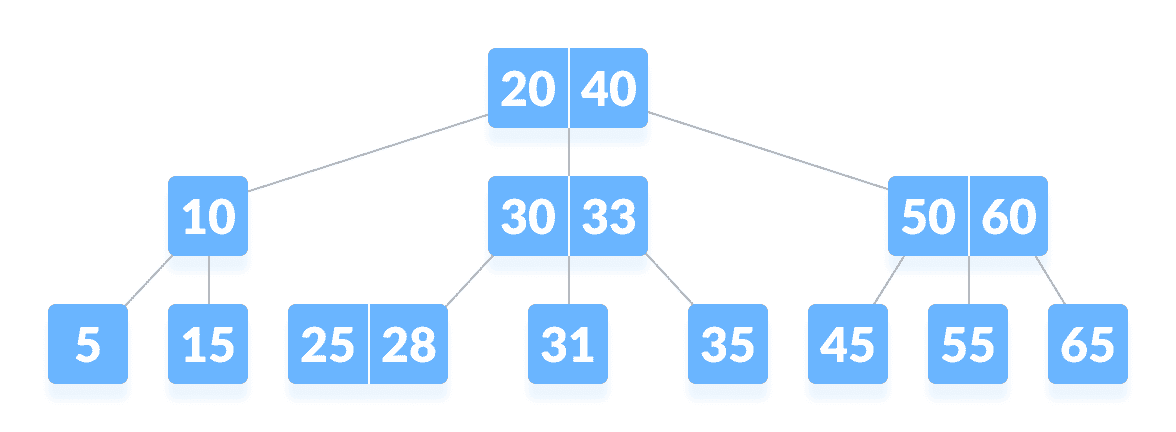
B-tree
为什么选择 B 树?
随着访问硬盘等物理存储介质所需的时间越来越少,对 B 树的需求也随之增加。 辅助存储设备速度较慢,容量较大。 需要这种类型的数据结构以最小化磁盘访问。
其他数据结构(例如二叉搜索树,avl 树,红黑树等)只能在一个节点中存储一个键。 如果必须存储大量键,则此类树的高度将变得非常大,并且访问时间会增加。
但是,B 树可以在一个节点中存储许多键,并且可以具有多个子节点。 这样可以大大降低高度,从而可以更快地访问磁盘。
B 树属性
- 对于每个节点
x,键以升序存储。 - 在每个节点中,都有一个布尔值
x.leaf,如果x是叶,则为true。 - 如果
n是树的顺序,则每个内部节点最多可以包含n-1键以及指向每个子节点的指针。 - 除根节点外,每个节点最多可以有
n个子节点,并且至少n / 2个子节点。 - 所有叶子具有相同的深度(即树的高度
h)。 - 根至少有 2 个子节点,并且至少包含 1 个键。
- 如果
n≥1,则对于任何高度为h且最小度为t ≥ 2的n键 B 树,h ≥ log_t(n+1)/2。
工作原理
搜索
在 B 树中搜索元素是在二叉搜索树中搜索元素的一般形式。 遵循以下步骤。
- 从根节点开始,将
k与节点的第一个键进行比较。
如果为k = the first key of the node,则返回节点和索引。 - 如果为
k.leaf = true,则返回NULL(即未找到)。 - 如果
k < the first key of the root node,则递归搜索此键的左子级。 - 如果当前节点和
k > the first key中有多个键,请将k与该节点中的下一个键进行比较。
如果为k < next key,则搜索该键的左子键(即k位于第一键和第二键之间)。
否则,搜索键的右子级。 - 重复步骤 1 到 4,直到到达叶子。
搜索示例
让我们在等级 3 下面的树中搜索关键字
k = 17。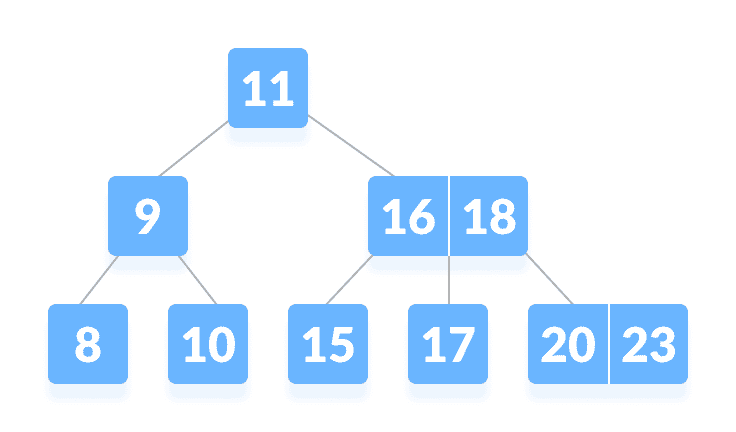
B 树在根目录中找不到
k,因此,请将其与根键进行比较。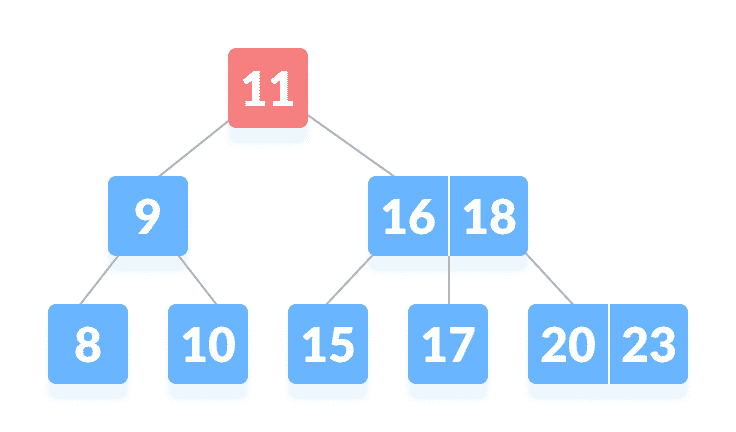
在根节点上找不到k从
k > 11开始,转到根节点的右子节点。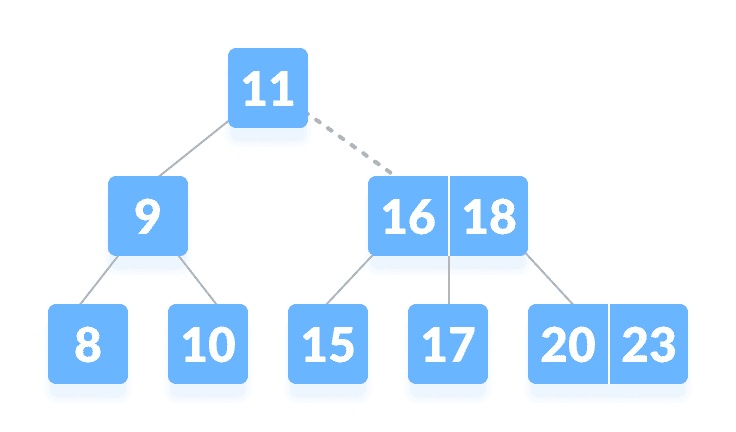
转到右侧的子树比较
k与 16。由于k > 16,将 k 与下一个键 18 比较。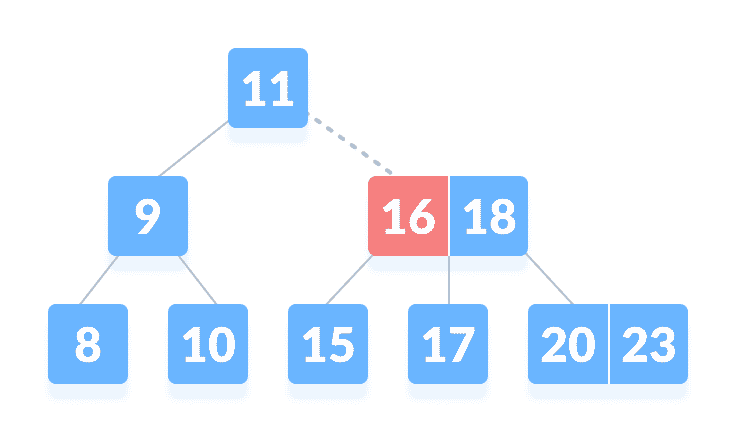
与从左到右的键比较由于
k < 18,k 在 16 到 18 之间。在右子级 16 或左子级 18 中搜索。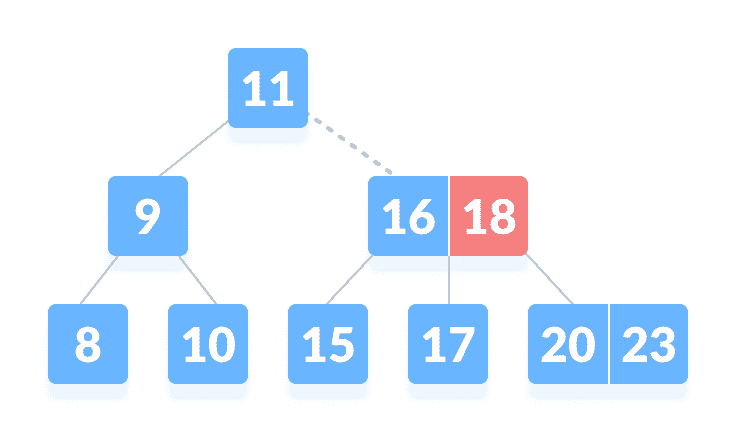
k在 16 到 18 之间找到了
k。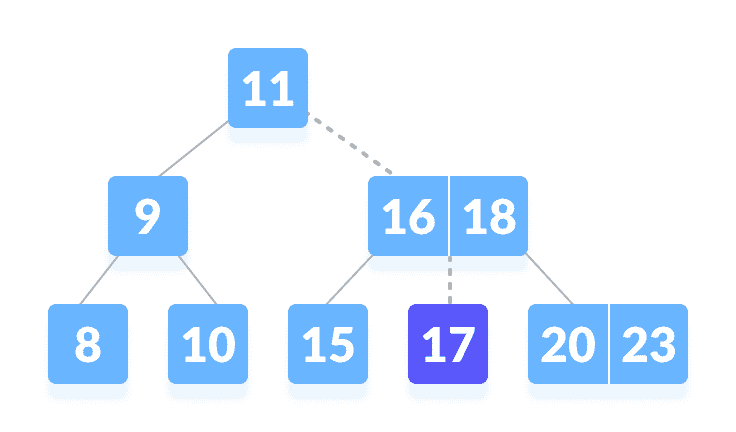
找到了k
搜索元素的算法
BtreeSearch(x, k)i = 1while i ≤ n[x] and k ≥ keyi[x] // n[x] means number of keys in x nodedo i = i + 1if i n[x] and k = keyi[x]then return (x, i)if leaf [x]then return NILelsereturn BtreeSearch(ci[x], k)
要了解有关不同 B 树操作的更多信息,请访问
Python,Java 和 C/C++ 示例
# Searching a key on a B-tree in Python# Create nodeclass BTreeNode:def __init__(self, leaf=False):self.leaf = leafself.keys = []self.child = []class BTree:def __init__(self, t):self.root = BTreeNode(True)self.t = t# Print the treedef print_tree(self, x, l=0):print("Level ", l, " ", len(x.keys), end=":")for i in x.keys:print(i, end=" ")print()l += 1if len(x.child) > 0:for i in x.child:self.print_tree(i, l)# Search keydef search_key(self, k, x=None):if x is not None:i = 0while i < len(x.keys) and k > x.keys[i][0]:i += 1if i < len(x.keys) and k == x.keys[i][0]:return (x, i)elif x.leaf:return Noneelse:return self.search_key(k, x.child[i])else:return self.search_key(k, self.root)# Insert the keydef insert_key(self, k):root = self.rootif len(root.keys) == (2 * self.t) - 1:temp = BTreeNode()self.root = temptemp.child.insert_key(0, root)self.split(temp, 0)self.insert_non_full(temp, k)else:self.insert_non_full(root, k)# Insert non full conditiondef insert_non_full(self, x, k):i = len(x.keys) - 1if x.leaf:x.keys.append((None, None))while i >= 0 and k[0] < x.keys[i][0]:x.keys[i + 1] = x.keys[i]i -= 1x.keys[i + 1] = kelse:while i >= 0 and k[0] < x.keys[i][0]:i -= 1i += 1if len(x.child[i].keys) == (2 * self.t) - 1:self.split(x, i)if k[0] > x.keys[i][0]:i += 1self.insert_non_full(x.child[i], k)# Splitdef split(self, x, i):t = self.ty = x.child[i]z = BTreeNode(y.leaf)x.child.insert_key(i + 1, z)x.keys.insert_key(i, y.keys[t - 1])z.keys = y.keys[t: (2 * t) - 1]y.keys = y.keys[0: t - 1]if not y.leaf:z.child = y.child[t: 2 * t]y.child = y.child[0: t - 1]def main():B = BTree(3)for i in range(10):B.insert_key((i, 2 * i))B.print_tree(B.root)if B.search_key(8) is not None:print("\nFound")else:print("\nNot found")if __name__ == '__main__':main()
// Searching a key on a B-tree in Javapublic class BTree {private int T;// Node creationpublic class Node {int n;int key[] = new int[2 * T - 1];Node child[] = new Node[2 * T];boolean leaf = true;public int Find(int k) {for (int i = 0; i < this.n; i++) {if (this.key[i] == k) {return i;}}return -1;};}public BTree(int t) {T = t;root = new Node();root.n = 0;root.leaf = true;}private Node root;// Search keyprivate Node Search(Node x, int key) {int i = 0;if (x == null)return x;for (i = 0; i < x.n; i++) {if (key < x.key[i]) {break;}if (key == x.key[i]) {return x;}}if (x.leaf) {return null;} else {return Search(x.child[i], key);}}// Splitting the nodeprivate void Split(Node x, int pos, Node y) {Node z = new Node();z.leaf = y.leaf;z.n = T - 1;for (int j = 0; j < T - 1; j++) {z.key[j] = y.key[j + T];}if (!y.leaf) {for (int j = 0; j < T; j++) {z.child[j] = y.child[j + T];}}y.n = T - 1;for (int j = x.n; j >= pos + 1; j--) {x.child[j + 1] = x.child[j];}x.child[pos + 1] = z;for (int j = x.n - 1; j >= pos; j--) {x.key[j + 1] = x.key[j];}x.key[pos] = y.key[T - 1];x.n = x.n + 1;}// Inserting a valuepublic void Insert(final int key) {Node r = root;if (r.n == 2 * T - 1) {Node s = new Node();root = s;s.leaf = false;s.n = 0;s.child[0] = r;Split(s, 0, r);insertValue(s, key);} else {insertValue(r, key);}}// Insert the nodefinal private void insertValue(Node x, int k) {if (x.leaf) {int i = 0;for (i = x.n - 1; i >= 0 && k < x.key[i]; i--) {x.key[i + 1] = x.key[i];}x.key[i + 1] = k;x.n = x.n + 1;} else {int i = 0;for (i = x.n - 1; i >= 0 && k < x.key[i]; i--) {};i++;Node tmp = x.child[i];if (tmp.n == 2 * T - 1) {Split(x, i, tmp);if (k > x.key[i]) {i++;}}insertValue(x.child[i], k);}}public void Show() {Show(root);}// Displayprivate void Show(Node x) {assert (x == null);for (int i = 0; i < x.n; i++) {System.out.print(x.key[i] + " ");}if (!x.leaf) {for (int i = 0; i < x.n + 1; i++) {Show(x.child[i]);}}}// Check if presentpublic boolean Contain(int k) {if (this.Search(root, k) != null) {return true;} else {return false;}}public static void main(String[] args) {BTree b = new BTree(3);b.Insert(8);b.Insert(9);b.Insert(10);b.Insert(11);b.Insert(15);b.Insert(20);b.Insert(17);b.Show();if (b.Contain(12)) {System.out.println("\nfound");} else {System.out.println("\nnot found");};}}
// Searching a key on a B-tree in C#include <stdio.h>#include <stdlib.h>#define MAX 3#define MIN 2struct BTreeNode {int val[MAX + 1], count;struct BTreeNode *link[MAX + 1];};struct BTreeNode *root;// Create a nodestruct BTreeNode *createNode(int val, struct BTreeNode *child) {struct BTreeNode *newNode;newNode = (struct BTreeNode *)malloc(sizeof(struct BTreeNode));newNode->val[1] = val;newNode->count = 1;newNode->link[0] = root;newNode->link[1] = child;return newNode;}// Insert nodevoid insertNode(int val, int pos, struct BTreeNode *node,struct BTreeNode *child) {int j = node->count;while (j > pos) {node->val[j + 1] = node->val[j];node->link[j + 1] = node->link[j];j--;}node->val[j + 1] = val;node->link[j + 1] = child;node->count++;}// Split nodevoid splitNode(int val, int *pval, int pos, struct BTreeNode *node,struct BTreeNode *child, struct BTreeNode **newNode) {int median, j;if (pos > MIN)median = MIN + 1;elsemedian = MIN;*newNode = (struct BTreeNode *)malloc(sizeof(struct BTreeNode));j = median + 1;while (j <= MAX) {(*newNode)->val[j - median] = node->val[j];(*newNode)->link[j - median] = node->link[j];j++;}node->count = median;(*newNode)->count = MAX - median;if (pos <= MIN) {insertNode(val, pos, node, child);} else {insertNode(val, pos - median, *newNode, child);}*pval = node->val[node->count];(*newNode)->link[0] = node->link[node->count];node->count--;}// Set the valueint setValue(int val, int *pval,struct BTreeNode *node, struct BTreeNode **child) {int pos;if (!node) {*pval = val;*child = NULL;return 1;}if (val < node->val[1]) {pos = 0;} else {for (pos = node->count;(val < node->val[pos] && pos > 1); pos--);if (val == node->val[pos]) {printf("Duplicates are not permitted\n");return 0;}}if (setValue(val, pval, node->link[pos], child)) {if (node->count < MAX) {insertNode(*pval, pos, node, *child);} else {splitNode(*pval, pval, pos, node, *child, child);return 1;}}return 0;}// Insert the valuevoid insert(int val) {int flag, i;struct BTreeNode *child;flag = setValue(val, &i, root, &child);if (flag)root = createNode(i, child);}// Search nodevoid search(int val, int *pos, struct BTreeNode *myNode) {if (!myNode) {return;}if (val < myNode->val[1]) {*pos = 0;} else {for (*pos = myNode->count;(val < myNode->val[*pos] && *pos > 1); (*pos)--);if (val == myNode->val[*pos]) {printf("%d is found", val);return;}}search(val, pos, myNode->link[*pos]);return;}// Traverse then nodesvoid traversal(struct BTreeNode *myNode) {int i;if (myNode) {for (i = 0; i < myNode->count; i++) {traversal(myNode->link[i]);printf("%d ", myNode->val[i + 1]);}traversal(myNode->link[i]);}}int main() {int val, ch;insert(8);insert(9);insert(10);insert(11);insert(15);insert(16);insert(17);insert(18);insert(20);insert(23);traversal(root);printf("\n");search(11, &ch, root);}
// Searching a key on a B-tree in C++
#include <iostream>
using namespace std;
class TreeNode {
int *keys;
int t;
TreeNode **C;
int n;
bool leaf;
public:
TreeNode(int temp, bool bool_leaf);
void insertNonFull(int k);
void splitChild(int i, TreeNode *y);
void traverse();
TreeNode *search(int k);
friend class BTree;
};
class BTree {
TreeNode *root;
int t;
public:
BTree(int temp) {
root = NULL;
t = temp;
}
void traverse() {
if (root != NULL)
root->traverse();
}
TreeNode *search(int k) {
return (root == NULL) ? NULL : root->search(k);
}
void insert(int k);
};
TreeNode::TreeNode(int t1, bool leaf1) {
t = t1;
leaf = leaf1;
keys = new int[2 * t - 1];
C = new TreeNode *[2 * t];
n = 0;
}
void TreeNode::traverse() {
int i;
for (i = 0; i < n; i++) {
if (leaf == false)
C[i]->traverse();
cout << " " << keys[i];
}
if (leaf == false)
C[i]->traverse();
}
TreeNode *TreeNode::search(int k) {
int i = 0;
while (i < n && k > keys[i])
i++;
if (keys[i] == k)
return this;
if (leaf == true)
return NULL;
return C[i]->search(k);
}
void BTree::insert(int k) {
if (root == NULL) {
root = new TreeNode(t, true);
root->keys[0] = k;
root->n = 1;
} else {
if (root->n == 2 * t - 1) {
TreeNode *s = new TreeNode(t, false);
s->C[0] = root;
s->splitChild(0, root);
int i = 0;
if (s->keys[0] < k)
i++;
s->C[i]->insertNonFull(k);
root = s;
} else
root->insertNonFull(k);
}
}
void TreeNode::insertNonFull(int k) {
int i = n - 1;
if (leaf == true) {
while (i >= 0 && keys[i] > k) {
keys[i + 1] = keys[i];
i--;
}
keys[i + 1] = k;
n = n + 1;
} else {
while (i >= 0 && keys[i] > k)
i--;
if (C[i + 1]->n == 2 * t - 1) {
splitChild(i + 1, C[i + 1]);
if (keys[i + 1] < k)
i++;
}
C[i + 1]->insertNonFull(k);
}
}
void TreeNode::splitChild(int i, TreeNode *y) {
TreeNode *z = new TreeNode(y->t, y->leaf);
z->n = t - 1;
for (int j = 0; j < t - 1; j++)
z->keys[j] = y->keys[j + t];
if (y->leaf == false) {
for (int j = 0; j < t; j++)
z->C[j] = y->C[j + t];
}
y->n = t - 1;
for (int j = n; j >= i + 1; j--)
C[j + 1] = C[j];
C[i + 1] = z;
for (int j = n - 1; j >= i; j--)
keys[j + 1] = keys[j];
keys[i] = y->keys[t - 1];
n = n + 1;
}
int main() {
BTree t(3);
t.insert(8);
t.insert(9);
t.insert(10);
t.insert(11);
t.insert(15);
t.insert(16);
t.insert(17);
t.insert(18);
t.insert(20);
t.insert(23);
cout << "The B-tree is: ";
t.traverse();
int k = 10;
(t.search(k) != NULL) ? cout << endl
<< k << " is found"
: cout << endl
<< k << " is not Found";
k = 2;
(t.search(k) != NULL) ? cout << endl
<< k << " is found"
: cout << endl
<< k << " is not Found\n";
}
B 树上的搜索的复杂度
最坏情况下的时间复杂度:Θ(log n)
平均情况时间复杂度:Θ(log n)
最佳情况时间复杂度:Θ(log n)
平均情况空间复杂度:Θ(n)
最坏情况的空间复杂度:Θ(n)
B 树应用
- 数据库和文件系统
- 存储数据块(辅助存储介质)
- 多级索引

